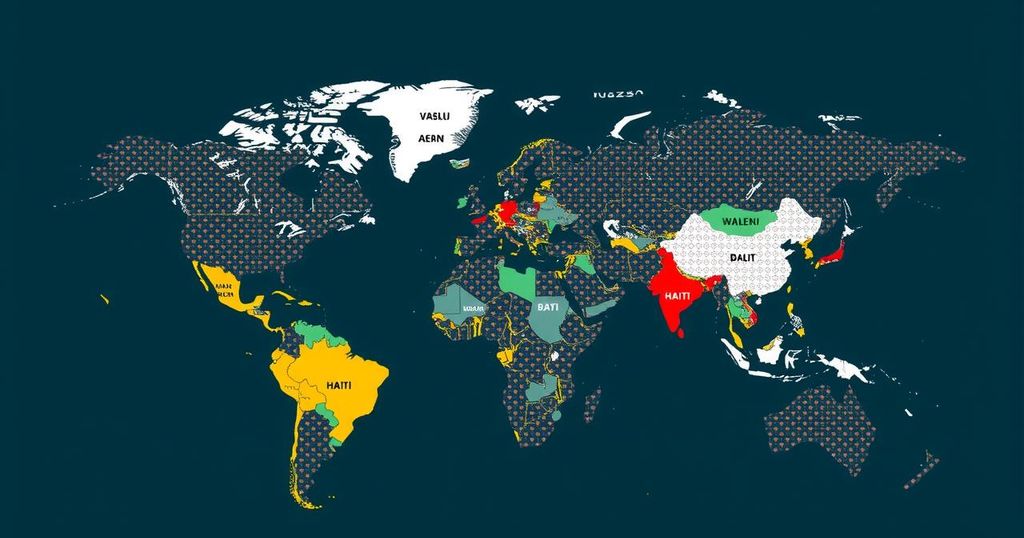Political upheavals in 2024, encompassing countries like Bangladesh, Myanmar, Syria, and Haiti, exemplify global instability due to coups and societal conflicts. Regime changes have often led to violent reprisals, humanitarian crises, and strained international relations. The situation across these nations highlights a pressing need for effective governance and respect for minority rights to mitigate ongoing unrest and promote regional stability.
In 2024, numerous nations experienced political upheaval and attempts to overthrow their governments, revealing the fragility of their political structures. Countries such as Bangladesh, Myanmar, Syria, and Haiti have encountered violent acts aimed at regime changes. While some coups have succeeded, societal unrest remains prevalent, often exacerbating tensions in neighboring states. For instance, Bangladesh faced turmoil resulting from protests against Prime Minister Sheikh Hasina’s policies, leading to her ousting and ensuing violence against minorities. Similarly, Syria again witnessed the seizure of significant territories by Islamist-led rebels, while Myanmar continues to grapple with civil war following the 2021 coup. Haiti is enduring severe gang violence amidst a backdrop of political instability, with armed groups controlling significant areas of the capital, exacerbating humanitarian crises in the region.
The events of 2024 reflect a broader trend of instability globally, with coups and conflicts undermining the progress of affected nations. Protests and revolts in Bangladesh, marked by student-led actions, have drawn international attention due to the violent reprisals against minority communities. Similarly, Syria and Myanmar illustrate the challenges faced in restoring order and governance, as militant groups threaten the fabric of society. Moreover, Haiti’s situation serves as a stark reminder of how prolonged instability and violence can lead to dire humanitarian conditions, impacting vulnerable populations, particularly women and children. The interconnectedness of these crises further complicates potential resolutions, calling for careful international engagement and support efforts.
In recent years, the rise of violent conflicts has underscored the need for effective governance and the protection of minority rights within these societies. The political strategies employed by leaders must navigate rising tensions and the diverse needs of their citizenry to foster stability. As these nations grapple with their crises, understanding the socio-political dynamics at play is crucial for designing effective interventions and support mechanisms. The plight of communities impacted by political upheaval warrants a global response focused on restoring peace and protecting human dignity.
“The Islamist groups have been emboldened to take to the streets after years of being suppressed, and Hindu groups have rallied in counter-demonstrations.” – News18
The recurring theme of instability highlighted through these events encapsulates the vulnerabilities of nations navigating regime changes and societal strife. Emphasizing the importance of international solidarity, addressing the root causes of conflicts and fostering dialogue among different factions is paramount. The turbulent events of 2024 reveal that without concerted actions to promote social cohesion and uphold respect for minority rights, the cycle of violence and political unrest is likely to continue, threatening the democratic fabric of these nations.
Title: Global Unrest in 2024: An Analysis of Regime Changes and Humanitarian Crises
International events in 2024 illustrated the increasing instability faced by numerous nations due to political coups and societal conflicts. These upheavals expose the inherent weaknesses within various political systems, as groups aim to wrest control often leading to violent clashes. Additionally, these events do not exist in isolation; repercussions such as humanitarian crises and regional instability often ripple beyond borders, affecting neighboring countries. Understanding these dynamics allows for a comprehensive view of the geopolitical landscape in 2024, highlighting crucial areas for diplomatic and humanitarian intervention.
The political turmoil witnessed in 2024 serves as a reminder of the volatility present in many regions of the world, affected by both historical grievances and the immediate consequences of failed governance. The situations in Bangladesh, Myanmar, Syria, and Haiti reflect broader patterns of unrest rooted in demands for political legitimacy and social justice. If the international community fails to proactively address these issues, the resulting humanitarian catastrophes will likely deepen, further entrenching cycles of violence and instability. Strategic efforts aimed at conflict resolution, alongside the protection of human rights, are essential for fostering long-term peace and security within these vulnerable nations.
Original Source: www.news18.com






